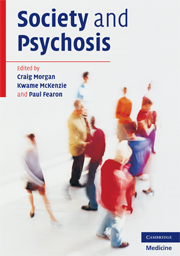Book contents
- Frontmatter
- Contents
- Contributors
- Acknowledgements
- 1 Introduction
- 2 Climate change in psychiatry: periodic fluctuations or terminal trend?
- Part I Theoretical and conceptual foundations
- 3 Social science, psychiatry and psychosis
- 4 Conceptualising the social world
- 5 Genes and the social environment
- Part II Social factors and the onset of psychosis
- Part III Social factors and the outcome of psychosis
- Part IV Models and conclusions
- Index
- References
4 - Conceptualising the social world
from Part I - Theoretical and conceptual foundations
Published online by Cambridge University Press: 07 December 2009
- Frontmatter
- Contents
- Contributors
- Acknowledgements
- 1 Introduction
- 2 Climate change in psychiatry: periodic fluctuations or terminal trend?
- Part I Theoretical and conceptual foundations
- 3 Social science, psychiatry and psychosis
- 4 Conceptualising the social world
- 5 Genes and the social environment
- Part II Social factors and the onset of psychosis
- Part III Social factors and the outcome of psychosis
- Part IV Models and conclusions
- Index
- References
Summary
Introduction
The social world has long been of interest to those concerned with the aetiology, course and outcome of psychosis. In the middle decades of the twentieth century, the relationship between aspects of the social world and the causes of psychosis was the subject of a number of influential studies (e.g., Faris and Dunham, 1939; Hare, 1956; Hollingshead and Redlich, 1958). It provided a rich subject for sociologists and others, as well as an important theme for psychiatric epidemiology. While the findings consistently indicated higher rates of serious mental illness in the most socially disadvantaged and marginalised groups, unresolved disputes about the causal direction of these associations contributed to a declining interest in the role of social factors in the aetiology of schizophrenia and other psychoses. Eclipsed for a period of time by other types of investigation – largely individually oriented and biological – the social world has appeared once again in our causal field. In recent years, a growing body of research has revived the notion that social factors play some role in the full sequence of causes of psychosis.
Conceptualising the social world, the subject of this chapter, is a critical first step in attempting to understand the aetiological role of social factors. The formulation of our research questions, interpretation of data and refinement of our hypotheses rely on our conception of the social world.
- Type
- Chapter
- Information
- Society and Psychosis , pp. 41 - 57Publisher: Cambridge University PressPrint publication year: 2008
References
- 6
- Cited by

